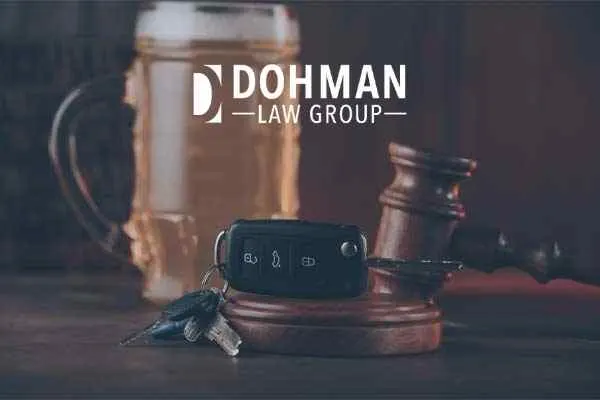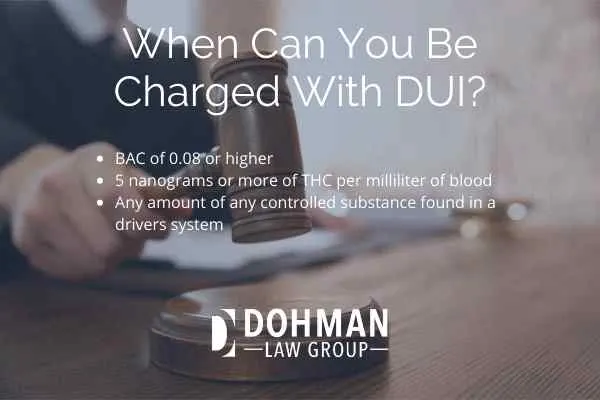You have several options for moving forward following a drunk driving arrest. These can all be explained in full by an experienced criminal defense attorney who can help guide you through the DUI process.
There are 3 ways your court case can proceed: you can plead guilty, which means that you must serve the sentence imposed by the judge; you can plead innocent, which means you will fight your DUI charge through the trial; or you can accept a plea bargain, which means you will enter a guilty plea in exchange for certain agreed on consequences.
If you have been arrested for a DUI in Illinois you will need the help of an experienced DUI attorney. Your lawyer will provide you with valuable legal advice, help you decide on the best path forward, and build the best defense possible if you decide to go to trial. Contact our expert legal team at Dohman Law to schedule an initial consultation to go over your case.
What is the DUI Court Process Like in Illinois?
Many people who get caught drunk driving don’t have any prior convictions. A DUI arrest typically comes out of nowhere, so it’s hard for people who haven’t had one before to understand what happens next. Additionally, the legal process is complicated and unfamiliar for most people which can make the entire experience all the more frightening. DUI cases can vary based on the circumstances surrounding your case, but the following is an overview of the different court hearings and common procedures that you might face during a typical DUI arrest.
The DUI Arrest
The DUI court process in Illinois begins as soon as a law enforcement officer suspects a driver is operating a vehicle under the influence. This usually follows an observation of a traffic violation or a response to a car accident. When the law enforcement officer observes the demeanor, behavior, and physical appearance of the driver, it can lead to suspicion of impairment.
Learn More: Understanding Your Miranda Rights During a DUI Arrest
If a police officer in Illinois suspects a driver of being impaired they will ask the driver to perform one or more of a number of standardized field sobriety tests. The driver is allowed to refuse to take the field tests. The driver may also be asked to take a portable breath test, which is not admissible in court and can be refused.

When the driver has been arrested for drunk driving and taken to the police station for booking, they will be asked to take a breathalyzer test to measure their blood alcohol concentration (BAC). The results of this test are admissible in court as long as the police officer follows the proper procedures for administering the test. The driver has the right to refuse this test but may face consequences for doing so. You may be charged with a DUI in Illinois if your blood alcohol concentration returns 0.08 or higher, however, this figure is not a guaranteed conviction in your case.
At this point, the driver is typically released on bond and given a court date and a notice for the suspension of their driver’s license effective 46 days out. For a first-time DUI offender, the suspension period will last for 6 months with a BAC of 0.08 or higher, or 1 year if the driver refused to take a breathalyzer test. For repeat DUI offenders, the suspension or revocation of their license will last for 1 year with a BAC of 0.08 or higher, or 3 years if the driver refused to take a breathalyzer test.
Petition for Your License
You may petition the court for a hearing to rescind the license suspension within 90 days of your DUI arrest. The judge must provide you with a court hearing within 1 month of your filing or on your initial court date.
First-time offenders may also apply for a Monitoring Device Driving Permit (MDDP) to allow them to continue driving. If this request is approved they will have to install a Breath Alcohol Ignition Interlock Device (BAIID) in their private vehicle. These devices are expensive to both install and maintain, and the driver will be responsible for paying these costs.
The Trial
A DUI offense is a criminal charge. The driver facing the charge will be required to appear in front of a judge to be advised of the charge(s) against them during their court hearing. The prosecution and the defendant’s attorney will exchange evidence and file different pretrial motions. The defendant will enter their plea, either guilty or not guilty, ideally after being advised by a criminal defense attorney.
If the driver pleads guilty, their lawyer will negotiate sentencing with the prosecutor, ranging from a period of time spent in court supervision to jail time. Criminal penalties for a DUI include statutory summary suspension, substance abuse treatment, lost driving privileges, jail time, expensive fines, and lawyer and court fees. If the driver pleads not guilty they will stand trial before a judge or jury. The defense attorney will spend time looking into the police’s actions surrounding your arrest, chain of custody for evidence, and other ways to build an aggressive defense.
The State will call witnesses during the trial to strengthen their case, including the arresting police officer. The defendant will have the opportunity to present evidence as they wish, including witness testimony supporting their case. Following this, the prosecutor and the driver’s DUI criminal defense attorney will make their final arguments to the judge or jury. The criminal court judge or jury will then pass judgment on whether or not the driver is guilty.
Learn More: How to Prepare For Court After a DUI
Sentencing
If you are found not guilty at the end of your DUI trial, you will be released with no further consequences.
If you are found guilty, however, you will be required to attend a sentencing hearing. The judge will hear aggravating circumstances including past criminal history and traffic violations, as well as mitigating factors and specific hardships you have faced. They will then weigh these factors with the charges in your case before deciding your criminal penalties.
Having the representation of an experienced DUI criminal defense attorney to handle your DUI charges can make all the difference. Every case is unique, and you will need a detailed and nuanced understanding of the law and the proceedings you will face in order to get the best possible result from your trial. Our attorneys at DUI Lawyers 24/7 are prepared to work with you no matter how complex your case is.
Illinois Drunk Driving Criminal Penalties
You can be convicted of a DUI in Illinois for either driving or being in “actual physical control” of a motor vehicle while meeting any of the following:
- A blood alcohol concentration reading of 0.08% or more;
- Under the influence of any illegal substance, drug, or intoxicating compounds to a degree that the person can’t drive safely, or
- With an amount of a controlled substance in the driver’s urine, blood, or other bodily substance
A DUI offender may be subject to administrative penalties following their arrest. Criminal penalties will be imposed if the driver is convicted in a criminal court.
In order to regain your driving privileges after a license suspension, you will be required to pay reinstatement fees. Illinois has implied consent laws that establish that all drivers are considered to have given consent to a chemical or field sobriety test if there is probable cause that they are driving drunk. Any driver who refuses fails, or fails to complete chemical testing will have their driver’s license suspended by the Secretary of State. This administrative punishment is known as statutory summary suspension. A driver will fail chemical tests if any of the following are detected:
- A BAC of 0.08 or higher
- 5 nanograms or more of THC per milliliter of blood or 10 nanograms or more per milliliter of another bodily substance
- Any amount of any controlled substance in the urine, blood, or bodily substance

A driver without a statutory summary suspension on their record and without a previous DUI conviction in the last 5 years will face the following suspension periods for their license:
- Six months for a failed test
- 12 months for refusing or failing to take a test.
A DUI offender may be able to successfully apply for a monitoring device driving permit to continue driving after their suspension. Doing so will require the driver to install an ignition interlock device into their vehicle. First-time offenders will have an easier time being issued a driving permit, although drivers who refuse chemical testing will not be eligible for one.
A first offense DUI charge in Illinois is classified as a Class A misdemeanor which can carry the following punishments:
- Up to 364 days in jail
- 6 additional months if the driver had a minor in the vehicle
Fines for a first-time DUI can include:
- A maximum fine of up to $2,500
- A minimum fine of $500 if the driver’s blood alcohol content of 0.16 or higher
- A minimum fine of $1,000 if there was an underage driver in the vehicle at the time of the arrest
First-time offenders may receive mandatory community service as follows:
- 100 hours of community service if their BAC was 0.16 or higher
- 25 days of community service if there was a minor in the vehicle, spent with a group that could provide a benefit to the minor put at risk
How Do I Fight Illinois DUI Charges?
One of the most beneficial things you can do for your DUI case is to choose the right lawyer in a timely fashion. Time is not often on your side when you are charged with a DUI, and the sooner you can get a lawyer onto your case, the better it will be for you. This means you may not have the opportunity to carefully vet all your options and weigh all of your pros and cons. Do your research online and ask around for recommendations to help speed the process up.
You will want to look for an experienced Illinois DUI attorney with extensive experience in DUI and criminal law. At Dohman Law, our dedicated attorneys are ready to help you navigate your case and provide you with the advice and representation you need to get the best possible result for your unique case.
Related Content: How to Beat a DUI in Illinois
Be sure to discuss trial plans for your case should you decide to take it in front of a judge. You could be surprised by how many viable defense options are open to you. An experienced attorney will know every loophole and legal strategy that you could use to get your charges reduced or dismissed, including:
- A non-standard field sobriety test, such as touching your finger to your nose or saying the alphabet backward, that is held as invalid in court
- You can demonstrate that the arresting officer had no probable cause initially pull you over
- The arresting officer failed to provide dispatch tapes
- You were driving on a private roadway or other area in which DUI law does not apply.
Hire a Talented Illinois Criminal Defense Lawyer
If you have been arrested for driving under the influence of alcohol you will need a talented attorney to protect you from your criminal offense charges. A lawyer with expertise in DUI law will be able to help you get the most out of your case, and protect you from overly harsh punishments.
The DUI lawyers in Rolling Meadows at Dohman Law will fight to protect you from the charges brought from your drunk driving offenses. Call us today or schedule an appointment online for your free initial case consultation!


